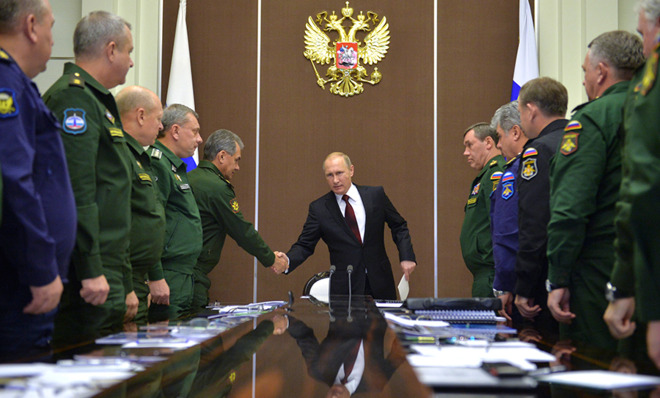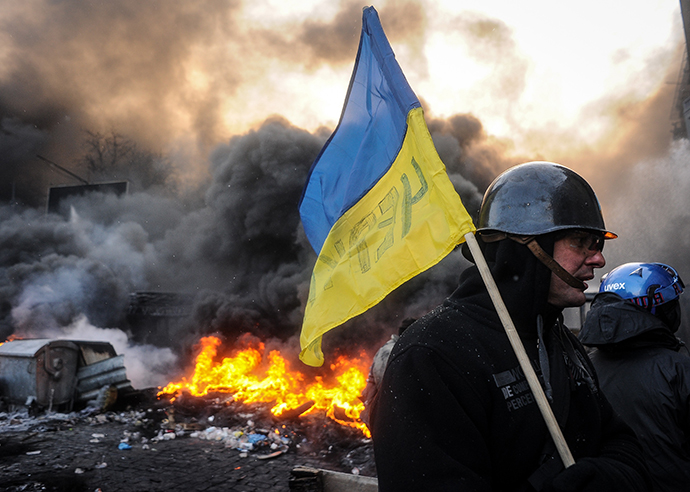Vladimir Putin's vexed eternal question: 'What does it mean to be Russian?'
Crimea and all that has followed, and may still follow, was never just about contemporary politics. It was about Putin beginning to articulate his answer to that question.

A free daily email with the biggest news stories of the day – and the best features from TheWeek.com
You are now subscribed
Your newsletter sign-up was successful

Prince Vladimir cut a tortured path to power. It all began when militant nomads murdered his father, Svyatoslav, on the banks of a river south of Kiev. Legend has it that those warriors made a gold-plated goblet of Svyatoslav's skull and then drank from it. Vladimir, in turn, consolidated control over the kingdom by battling his brother. Their war ended when Vladimir called a meeting and had his goons greet his guest with two swords to the chest. The prince regretted it, but, he said, "It was not I who began to fight with my brother, but he, and I was for that reason overcome by fear, and therefore have come out against him."
He proceeded to impregnate his brother's wife, and took to ruling Kiev alone. He was "insatiable in vice," with five brides and 800 concubines. Outside his castle, he erected an idol to Perun, God of Thunder. The idol's body was wood, its head silver, and its mustache gold. Vladimir's subjects sacrificed their sons and daughters at its feet. Thus emerged the ancient kingdom of Kievan Rus, progenitor of the eastern Slavic world, origin of Russia and Ukraine, and wellspring of present-day strife.
(More from The Big Roundtable: The bridge to Sodom and Gomorrah)
The Week
Escape your echo chamber. Get the facts behind the news, plus analysis from multiple perspectives.

Sign up for The Week's Free Newsletters
From our morning news briefing to a weekly Good News Newsletter, get the best of The Week delivered directly to your inbox.
From our morning news briefing to a weekly Good News Newsletter, get the best of The Week delivered directly to your inbox.
I want to tell you a story about Ukraine, but it's not really about what's happening in Ukraine now, not really about soldiers and seizures and referendums. The cold calculus of geopolitics is secondary here. This — the precipice that the world is teetering on — is about identity and memory and deep, deep history. This is a story about the Russian Empire.
In late February, I set out for Ukraine from my home in Moscow. I rode a nearly empty night train, a string of blue carriages with yellow stripes. Frost tinted the windows and the picture outside seemed an endless repeating loop of birches and barren fields. The former Ukrainian president, Viktor Yanukovych, had just fled his gaudy palace following months of protests.
In the Kiev city center, thousands had been gathering since last November. They built a tent camp and lived on the barricades, bearing winter frost and feeding each other borscht in plastic bowls. The movement came to be known as "Maidan," or "Euromaidan," for the square it grew on and the ambitions it harbored. The nominal cause of the unrest was Yanukovych's decision not to sign a trade agreement to move Ukraine closer to the European Union, but to turn, instead, to Mother Russia. Fierce clashes between student protestors and Ukraine's special police, the Berkut, soon galvanized a wider population, and Maidan become one of those misguided synonyms — like Tahrir and Gezi — for freedom, democracy, and the better life. It all culminated in late February, when Yanukovych unleashed snipers onto the streets, hoping to retain his tenuous grip. More than a hundred protestors died, and Yanukovych disappeared.

While the demonstrations achieved their goal of deposing the reviled ruler (he took refuge in Russia), the upheaval that followed has imperiled Ukraine's very existence and deeply shaken the international order. Russia annexed Crimea and has been sowing chaos throughout eastern Ukraine ever since. This sudden aggression stunned the West, calling wider European security into doubt. Meanwhile, Ukraine itself descended into a bloody war. Perhaps most frightening of all, the story continues: Russia and the West are no closer to compromise, let alone understanding, and violence still rages in eastern Ukraine, where more than 3,700 people have died since late April, including 298 innocent passengers on Malaysia Airlines Flight 17.
A free daily email with the biggest news stories of the day – and the best features from TheWeek.com
(More from The Big Roundtable: My journey to the new Jerusalem)
Yet as I witnessed these events unfold while reporting on the crisis, I found myself slipping backwards in time, seeking explanations for the current chaos in the shady recesses of history.
I arrived first in Kharkiv, Ukraine's second-largest city, near the eastern border with Russia. Two groups stood guard there on the city's main square, a teardrop-shaped stretch of forced grandeur. One had a makeshift tent camp around the central statue of Lenin, where they stood guard at his stone feet. On the fences they hung signs: "Fascists: Don't test Kharkiv's patience," "We don't need NATO," and "Don't tear down monuments!" Under the influence of a noxious Russian propaganda campaign, this group saw the revolution in Kiev as a fascist-led coup bent on oppressing Ukraine's mostly Russian-speaking eastern population, delivering Russian holy sites into NATO's hands, and destroying virtually everything they held dear, even if they themselves could not identify what, exactly, was so dear.
Though this picture bears little resemblance to reality, it contains just enough streaks of truth to have great power, like a nightmare full of familiar faces. Far-right nationalist groups did play a crucial role on the Maidan (though they do not, as Russian television loves to claim, control Ukraine). American and European officials, such as Victoria Nuland, John McCain, and Catherine Ashton, did make stunningly tactless appearances at the protests (though the West did not finance the entire enterprise, contrary to popular Russian opinion). The new post-revolutionary government did, in a moment of extraordinary idiocy, pass a law stripping Russian of its status as an official language (though the move was ultimately vetoed). And tearing down Soviet statues did become a symbolic act in Ukraine (including, much later, this very one in Kharkiv).
Across the square, another crew — this one representing the Maidan movement — occupied the regional administration building, hoping to keep the city from slipping into pro-Russian hands while the state reassembled itself in Kiev. They donned blue and yellow ski masks and built barricades of their own. "They need to study history," Pytor, a retired factory worker, said of the Lenin-statue defenders across the way. "And not just the propaganda." Vlad, sitting nearby and eating ramen from a clear plastic cup, went further: "Ukraine lived under occupation until 1991. The monument means nothing to us." Many inside the building saw themselves as part of a historic transformation: from a Russian vassal into a truly independent nation.
Caught between the two sides were the many Ukrainians with no interest in another political squabble. "All our politicians are thieves," one young mother told me as she cooed at the baby in her stroller and shuffled across the square. And then, more tragically, were those who could not possibly choose sides, those with mixed blood and dual allegiances, those who thought they lived in a happy family.
(More from The Big Roundtable: The robots of resistance)
As Dmitry Furman, a noted scholar, wrote back in 1997, "Russian-Ukrainian problems are not concrete and rational problems… What kind of fights can there be between brothers?… What is it that divides Ukrainian and Russian brothers when they 'recall' that they are separate peoples? It is the same stuff that normally divides brothers — the struggle over parents, primogeniture, legacy."
Fights between brothers can be the most brutal fights of all, especially when those brothers share a deep and disputed history.
CRIMEA
A Region Changes Hands. Again.
From Kharkiv, a night train carried me down across the darkened steppe to Crimea, where late winter fog filled the skies. When I arrived, I was still in Ukraine. By the time I was ready to leave, some three weeks later, I was (de facto) in Russia.
Crimea is a peninsula that juts south into the Black Sea. Ancient vineyards line its rolling hills and jagged juniper trees hang off its coasts. Traces of the Soviet — dilapidated homes, boxy buildings, monuments to labor — punctuate an otherwise beautiful landscape, one comparable in stretches to the better-known rivieras of Italy or France. Further inland, though, bleak grasslands and swampy isthmuses link Crimea to Ukraine. Sitting on a civilizational fault line, the region has attracted a murderer's row of empires, belonging at various times to the Greeks, Romans, Byzantines, Ottomans, and Russians.
For Russia the Crimean question is one of origins. In the twenty-three years since the Soviet Union collapsed, Russia has been struggling to identify a new national idea: What does it mean to be Russian? To be Russian now, absent tsarism or communism? What recent events make clear is that for Russia, empire is an existential yearning. Russia cannot be merely a country; it must control others in order to validate its sense of grandeur. And at the heart of this Russian imperial project lies Ukraine.
READ THE REST OF THIS STORY AT THE BIG ROUNDTABLE.
This story originally appeared at The Big Roundtable. Writers at The Big Roundtable depend on your generosity. All donations, minus a 10 percent commission to The Big Roundtable and PayPal's nominal fee, go to the author. Please donate.
-
 How the FCC’s ‘equal time’ rule works
How the FCC’s ‘equal time’ rule worksIn the Spotlight The law is at the heart of the Colbert-CBS conflict
-
 What is the endgame in the DHS shutdown?
What is the endgame in the DHS shutdown?Today’s Big Question Democrats want to rein in ICE’s immigration crackdown
-
 ‘Poor time management isn’t just an inconvenience’
‘Poor time management isn’t just an inconvenience’Instant Opinion Opinion, comment and editorials of the day